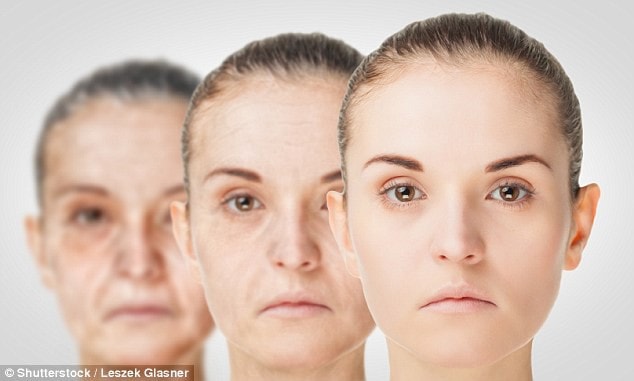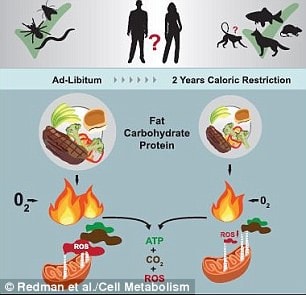15% less calories, good for all
Calorie restriction may reduce the risk of premature death by protecting the body from harmful byproducts of converting food into energy.
Researchers have observed in animals that fewer calories keep core body temperature lower and slow metabolism, “insulating” the body from the damage that comes with metabolism.
Oxidative byproducts of metabolism are linked to an increased risk of diseases such as cancer, diabetes and rheumatoid arthritis.
In a first-in-human study, scientists at Pennington Biomedical Research found that reducing calories by 15% led to weight loss, less oxidative stress, and a slower metabolism.

Reducing calories may help reduce oxidative stress that contributes to aging and age-related diseases.
Fast metabolisms keep young people slim, but as we age, our bodies convert food into energy more slowly.
So starting in our 30s, we start to lose a little muscle mass, weight loss becomes more difficult, and our appetite decreases.
These effects may not sound appealing, but slowing down your metabolism is actually a smart idea to help delay the negative effects of aging.
A high metabolic rate is also a very stressful condition: every system in the body has to work harder to convert food into energy.
When calories are burned, they are converted to energy through a process of splitting an oxygen atom.
The byproduct of this process is an unbalanced form of oxygen with only one electron, called a free radical. Atoms like to be stable, so a free radical will seek out an electron from other atoms in the body, acting like a “tiny” attacker on other cells and DNA.
This causes what is known as oxidative stress, and the faster and more frequently these metabolic reactions occur, the more free radicals are produced and the more severe the stress.
Our bodies also produce enzymes that seek out and neutralize free radicals, but as we age this production line slows down.
So, according to some theories of aging, if our metabolism remains as high as it was in our youth, the production of free radicals will exceed our natural antioxidant capacity.
That's why diets rich in antioxidant-rich foods like oily fish, nuts and vegetables can improve our protection against aging and age-related diseases.
Furthermore, as new research suggests, by reducing overall calories, we can slow metabolism and prevent oxidative damage.

Studies have shown that calorie restriction can extend the lives of animals by reducing oxidative stress caused by the process of converting food into energy. New research suggests the same is true for humans.
“We know from mammal studies that the smaller the mammal, the faster its metabolism and the shorter its lifespan,” said Dr. Leanne Redman, a clinical science instructor at Pennington Biomedical Research in Louisiana.
However, before her team began their research, this theory had not been widely tested in humans.
So researchers recruited 53 non-obese people aged 21 to 50 and reduced their calorie intake by 15% for 2 years.
Participants on the calorie-restricted diet lost an average of almost 5kg and – more importantly, according to the study’s aims – showed fewer signs of oxidative stress and signs of a slowed metabolism.
The rejuvenation in the experiment "supports two of the oldest theories of human aging: the slow metabolism theory and the oxidative damage theory," Dr. Redman said.
“Calorie restriction can slow basal metabolism, and if metabolic byproducts accelerate aging, then sustained calorie restriction over many years may reduce the risk of chronic disease and prolong life, even in otherwise healthy people.”
While it's unclear how many years of life expectancy we'd add if we cut calories, the animal data are correct, with Dr. Redman saying that a 25% calorie cut could extend life expectancy by up to seven years.
The trick is to maintain a low-calorie diet even after you've lost weight.
This may require effort, but “eating a balanced diet with fewer calories will be beneficial against the secondary causes of aging.”
“These are lifestyle diseases like heart disease, diabetes, stroke and so on,” says Dr. Redman. “We found that biomarkers like blood sugar, insulin, lipids also improved with calorie restriction in this group of otherwise healthy people.”






